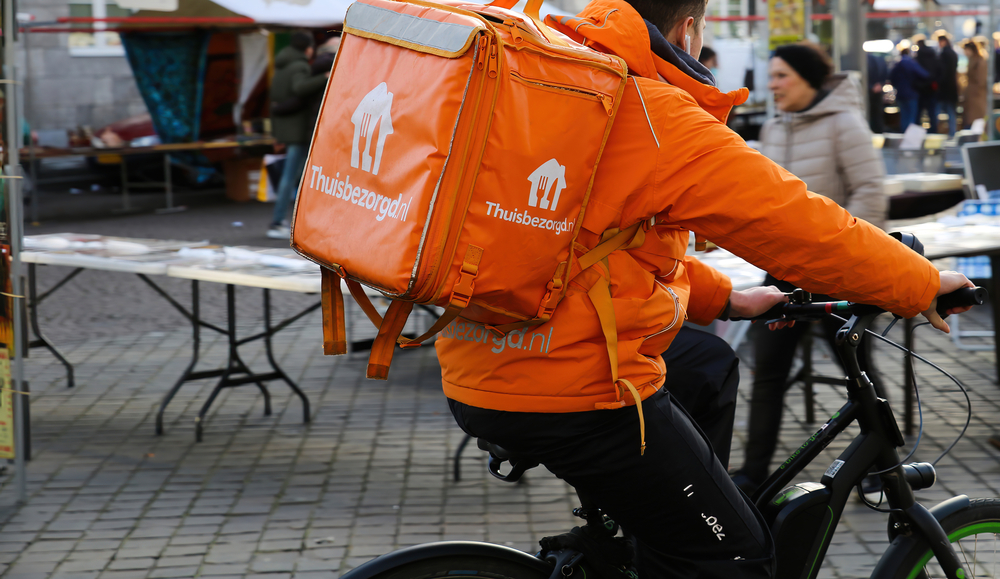Almost all students are looking for ways to finance their studies in the Netherlands — and preferably spare a little extra cash for drinks. 🍻
But here’s a tip: if you study in the Netherlands, you might not even realise how much money you could be missing out on.
The Netherlands offers an aid system to help students finance their studies — and it’s not limited to Dutchies.
This is the complete guide to student loans, financing, and scholarships in the Netherlands to get those benefits, stash some cash, and gain some financial knowledge. 💸
- Paying for university in the Netherlands
- EU/EEA students: loans, financing, and scholarships
- Loans, financing, and scholarships for non-EU/EEA students
- Student jobs in the Netherlands
- Costs of studying in the Netherlands
- How to save money when studying in the Netherlands
- Student finance, loans, and scholarship in the Netherlands: frequently asked questions
Paying for university in the Netherlands
Of course, the first hurdle to cross when studying in the Netherlands is how to pay for university.
Compared to some other countries, the Netherlands can be extremely affordable when studying abroad. But that’s not to say that Dutch university education is cheap.

How expensive your study will be and how much funding you can get for it is dependent on one major classification: whether you’re an EU/EEA/Swiss student or not.
The difference between EU/EEA and Swiss students and non-EU/EEA students
Now, you might be wondering what on earth EU/EEA means and whether it applies to you.
Tuition fees and student finance in the Netherlands differ if you are from the European Union (EU) or the European Economic Area (EEA) or from a country outside of these areas.
EU, EEA, and Swiss students
You’re an EU/EEA student if you are a national of:
Belgium, Bulgaria, Cyprus, Denmark (excluding the Faroe Isles and Greenland), Germany, Estonia, Finland, France (including French Guiana, Guadeloupe, Martinique, Mayotte, La Reunion and Saint-Martin), Greece, Hungary, Ireland, Italy, Croatia, Latvia, Liechtenstein – (EEA), Lithuania, Luxembourg, Malta, the Netherlands (excluding Aruba, Curaçao, Sint Maarten, Bonaire, Sint Eustatius and Saba), Norway, Austria, Poland, Portugal (including the Azores and Madeira), Romania, Slovenia, Slovakia, Spain (including the Balearic Islands and the Canary Islands), Czech Republic, Iceland, or Sweden.
Switzerland is not an EU/EEA member state, but Swiss nationals have the same rights of residence as EU/EEA citizens.
Non-EU and EEA students
If you do not have a nationality on the above list, you are a non-EU/EEA student.
If you are from the EU/EEA, you can access most Dutch student financing that local students receive.
On the other hand, if you aren’t an EU/EEA national, you won’t qualify for student financing from the Dutch government. You still have a few options to finance your studies, such as getting a part-time job or applying for scholarships.
EU/EEA students: loans, financing, and scholarships
Yep — even if you aren’t a Dutchie, EU/EEA and Swiss students can still apply for student finance if they study in the Netherlands. Here’s how!
Student financing (studiefinanciering) from the Dutch government
Student financing is a form of student aid offered by the Dutch Ministry of Education and Culture (DUO).
DUO handles everything to do with studying in the Netherlands, including enrolling for higher education and registering your diplomas and qualifications. There are some baseline requirements you need to meet to be eligible for student financing:
- You are a Dutch national, have the same rights as a Dutch national, or are an EU/EEA/Swiss national,
- You are registered for a full-time or dual degree programme in the Netherlands in a research-oriented university (WO) or a higher professional education university (HBO),
- You are under 30 years old,
- You are registered at a municipality. You have a BSN and a DigiD.
- You have a Dutch bank account in your name.

There are four main types of Dutch student financing:
- a supplementary grant,
- regular loans,
- tuition fee loans, and
- a student travel product.
Keep in mind that not everyone is eligible for all four, as each type has some additional requirements to qualify.
So what are they? Let’s take a look!
Supplementary grants
The supplementary grant is a sort of monthly allowance the Dutch government gives you for your monthly living expenses.
This grant can get you a few hundred euros for your monthly budget, depending on your personal situation.
You’re free to spend it how you like — so whether you want to spend it on groceries, textbooks, or just beers on a night out, it’s up to you!

The best part is that the supplementary grant is a “gift” from the Dutch government, meaning you don’t have to pay it back if you graduate within 10 years of studying.
However, you only qualify for this supplementary grant if your parents’ total income is less than €50,000 per year.
You can check whether you qualify for this type of student financing through the DUO website.
Regular loans
“What do you mean ‘regular’ loan?” Well, despite the name, a regular loan is similar to a supplementary grant.
You can apply for a loan through DUO and adjust how much money you borrow per month. The money will be given to you every month as a secondary allowance.
The key difference between a regular loan and a supplementary grant is that taking out a regular loan will incur student debt. You then make payments on this debt after your graduate.

There are a few requirements you need to meet to qualify for a regular Dutch student loan:
- You need to be an EU/EEA or Swiss national
- You have lived in the Netherlands for at least five years, or you are working at least 56 hours per month.
It’s important to know that if you want to eventually buy a house, start a business, etc., in the Netherlands, your student debt will be taken into account when your bank calculates your borrowing potential and interest.
Tuition fees loan
Tuition fee loans are for — you guessed it — your Dutch tuition fees (and your tuition fees only!)
Like a regular loan, you also have to pay back your tuition fees loan after graduating.
But luckily, the interest rates for tuition fees loans are low (typically less than 1% per year). Super!
If you’re eligible for student financing, you need to meet a few requirements to qualify for a tuition fees loan:
- You are under 30 years old
- You come from the EU/EEA or Switzerland
- You study full-time or a dual course at a higher professional education university (HBO) or research-oriented education university (WO)
- You pay tuition fees in the Netherlands
DUO can give you more information about applying to finance your study in the Netherlands this way.
Student travel product
This type of student financing is for those travel buffs out there! The student travel product means you can use Dutch public transport with a huge discount.
The student travel product tends to be the most common form of student financing non-Dutchies get.
READ MORE | The ultimate guide to taking a train in the Netherlands: from OV cards to saving money
Students can choose between a weekend or a weekday subscription for their student travel product.
If you choose a weekday subscription, you can travel for free on weekdays and 40% off on weekends.
The weekend subscription has it the other way around.

If you’re an EU/EEA or Swiss national, you need to meet the following requirements:
- You follow a full-time study programme at MBO (vocational education), HBO, or WO level. Even if you are under 18, you will get a student travel product
- You must be younger than 30 when the student travel product starts.
- You, or your non-Dutch parent or partner from the EU/EEA or Switzerland, have lived in the Netherlands for five consecutive years or longer.
And lastly, if you have a Type I residence permit (you can check this on the back of your ID card), use this handy tool by DUO to see whether you’re eligible for the product.
How to apply for student finance in the Netherlands
So you’re applicable for student financing — hoera! 🎉
Now, how do you actually get student financing for yourself?
To apply for any student finance type, you typically need a valid residence permit and a BSN (citizen service number). Your local municipality will give you a BSN after you register in the Netherlands.
To apply for student finance:
- Log on to the DUO website. You’ll need your BSN and DigiD to prove your identity.
- Go to “Mijn Producten” (My Products) then “’Studiefinanciering” (Student Finance)
- Click on “Studiefinanciering” at the top right of the screen.
- Find the “Nu aanvragen” (Request now) section for each type of student financing.
- Select the type of student financing you are eligible for and fill in the relevant details DUO asks you for.
Warning! Make sure to sort your student finance in DUO before the first day of the month that your study begins (the government recommends three months before). Otherwise, your payments may be delayed. 😬
Scholarships to study in the Netherlands for EU/EEA students
If you aren’t eligible for student financing or just want an opportunity to get free money while you’re studying in the Netherlands, there are many scholarships available to EU/EEA students. Here are some of the most common ones.

Erasmus+
The Erasmus+ Programme is one of the most popular scholarships in the Netherlands (and is not to be confused with the Dutch university, of course!).
It’s intended to help both EU/EEA and non-EU/EEA students find the perfect destination for a study exchange or a traineeship in the EU.
Each university has a different way of providing scholarships to its students who go on a study exchange in Europe, and their requirements vary per university.
It’s best to consult with your study/exchange advisor to see the exact requirements and if you fit into them!
Hundreds of universities across Europe participate in the Erasmus+ programme, which makes studying abroad super accessible. You can be at any level of higher education to apply. It’s an offer you simply can’t refuse. 😍
Erasmus Mundus Programme
This programme is intended for EU master’s students. With an Erasmus Mundus scholarship, you must study in at least two countries as part of the programme for one to two years.
You need to have a bachelor’s degree at a recognised level, and all of your costs (tuition fees, travel costs, study material, and more) are covered!
Loans, financing, and scholarships for non-EU/EEA students
If you are a non-EU/EEA student, there’s bad news: you probably don’t qualify for regular loans, tuition fee loans, or supplementary grants in the Netherlands.
But don’t let that discourage you!
There are other ways to finance your Dutch studies yourself, starting with private loans and scholarships.
Taking out private loans
Because only Dutch, EU/EEA, and Swiss can take out a tuition fees loan, non-EU/EEA students typically have to take out private loans.
If you’re interested in taking out a private loan, you should contact your university’s student advisor to see how this works and whether you’re eligible to take out a private loan from your Dutch bank.

You have to pay back this type of loan with interest after you graduate, but the catch is that it tends to have a higher interest rate (between 8-13%).
This is a much higher interest rate than the regular loan a Dutch, EU/EEA or Swiss national can take out in the Netherlands.
If you don’t want to incur student debt or feel like you have a great CV to show off, applying for a scholarship is another option — and it might be more up your alley.
Scholarships to study in the Netherlands for non-EU/EEA students
As a non-EU/EEA student, you might find yourself feeling a little more pressed for money (international tuition fees are no joke).
If you’re looking for other forms of student financing, the Netherlands has plenty of scholarships you can apply to, but you typically face some tricky competition.

Here are a few popular scholarships for non-EU/EEA students in the Netherlands.
Erasmus+
We mentioned it before, but this is a really good one! The Erasmus+ Programme is a scholarship for all students to fund their study exchange or traineeships abroad in the EU.
Many higher education institutions in the Netherlands participate in this programme and have different requirements to join. It’s best to ask your study/exchange advisor to determine whether your university takes part and what the requirements are.
You can study in one of a hundred partner universities across Europe for your exchange or traineeship, and the scholarship can cover a lot of your costs — what’s not to love?
MENA Scholarship Programme
This scholarship is intended for young professionals from the Middle East and North Africa to take short courses and training in a specific field of their choice.
The Holland Scholarship
The Holland Scholarship is a one-time grant of €5000 in your first year of university, available to non-EU/EEA nationals.
Many research universities and higher professional education institutions participate in the scholarship, so you might find your university there too!
The Orange Tulip Scholarship
Also known as the OTS, this scholarship is available for non-EU nationals from NESO countries (Netherlands Education Support Offices).

You can find the exact list of countries and the other requirements for this scholarship on the NUFFIC website.
How to find scholarships to study in the Netherlands
The scholarships above are just a handful of many available to EU/EEA and non-EU/EEA students — there are hundreds of scholarships waiting for applications out there!
Your university might also have specific scholarships for their students available, so be sure to check out what your university can offer you as soon as you can. 🏃🏻
You can usually contact your study programme’s student advisors to help you find appropriate scholarships and finance your studies in other ways.
How to apply for scholarships to study in the Netherlands
Each scholarship has its own requirements and methods to apply, but typically you’ll need to:
- Find a scholarship online or via your university
- Take note of the requirements, your eligibility, and the deadline for the scholarship
- Prepare your documents; this usually consists of a valid ID (your passport or Dutch residence permit will do), proof of enrolment at your university, your incredible CV, and a fantastically written motivation letter
- Submit your documents before the due date
- Wait for the magic to happen! 💰
Student jobs in the Netherlands
If you aren’t entitled to student financing, loans, and scholarships in the Netherlands, there’s another way you can finance your studies: student jobs!
We get it, though; you might be concerned about work-school-life balance.

A student job is almost always part-time, meaning you can work minimal hours and schedule around your study commitments.
A bonus is that you often don’t need to speak fluent Dutch (or at all).
This will probably come as a relief to internationals, but trying your hand at learning and practising Dutch is something we’d recommend!
Best types of student jobs
There are a few student jobs you can find anywhere, regardless of the city you live in. For example, retail and customer service always need people to work part-time.
- Retail stores 👕
- Grocery stores 🍍
- Bike delivery companies (UberEats, Deliveroo, Gorillas, etc.) 🚴♀️
- Hotels (as a receptionist or housekeeper) 🏨
- Call centres or help desks 📞
- Your university 🎓
- Restaurants or cafes 🥞

How to find a student job
Your university is a great place to start looking for a student job to finance your studies. They may have some connections to employment agencies or a student portal to see their vacancies around the city.
You can also google for student jobs in the Netherlands or your city or check websites like Indeed or Glassdoor.
Student jobs and visas
There are a few things to keep in mind regarding working and visas.
If you are an EU/EEA or Swiss national, you do not need a work permit, and there is no limit to how many hours you can work while you’re studying.
But if you aren’t an EU/EEA or Swiss national, there are a few restrictions. If you live in the Netherlands on a student visa, you need to confirm your working permissions with the immigration office of your university.
Typically, your employer has to provide you with a personal work permit. With this, you can only work for a maximum of 16 hours per week during the year, or full-time during the summer months (June, July, and August).

However, if you are studying at a higher education institution in the Netherlands and need or want to complete an internship for your study, you do not need a work permit.
Instead, your host university, internship employer, and you can sign an internship agreement available through the Dutch Ministry of Social Affairs and Employment. If in doubt, it’s best to consult the Dutch government website for information on your specific situation.
Costs of studying in the Netherlands
There are a few key costs to consider when you’re a student in the Netherlands.
Tuition fees
Tuition is one of the major costs of studying at a Dutch university. The cost of yearly tuition fees depends on a few things:
- Whether you’re an EU/EEA student or a non-EU/EEA student
- Whether you’re applying for a bachelor’s or a master’s degree
- If the university is private or public
- What kind of higher education you’re doing (research-oriented vs higher professional education)
- The type of study programme you are doing
So how much cash will you have to cough up?
On average, a student from an EU/EEA country pays between €2,000 and €4,000 per year.
A non-EU/EEA student pays between €6,000 and €15,000 per year.
TIP: The average higher education programme in the Netherlands tends to be shorter than most. Paired with affordable yearly tuition fees, students often pay less for their degree overall compared to their home countries! 🙌
Living expenses
Other than tuition fees, another big expense in the Netherlands is your housing and utilities.
Before moving to the Netherlands, you should know that it’s notorious for its housing crisis, especially for students. 😵💫

Finding a house in your city at an affordable price can be a real struggle, especially if you’re on a time limit. Your monthly rent will depend on a few factors, including:
- Which city and neighbourhood you’re living in
- If you want to live alone or with other people
- If you live in student housing or private accommodation
- Whether the rent price includes utilities (gas, water, and electricity, or GWL in Dutch)
READ MORE | Renting in the Netherlands: the ultimate guide
An average student room is between €500 and €800 a month. On the extreme ends, students can rent rooms from as low as €350 to as high as €1500 per room. 😬
Food
As a student, you can get by shopping once or twice a week at most. Depending on which supermarkets or grocers are available, you can get basic groceries for €50 to €60 per week.
Travel
It’s easy to keep your travel costs down in the Netherlands because it’s super bike-friendly. A good bike will set you back around €100 and is the main form of transport for, well, everyone!

For longer distances, Dutch public transport is also exceptionally good and a fraction of the cost compared to Ubers or taxis. Owning a car as a student in the Netherlands is practically unheard of.
School supplies
Most Dutch universities have deals with publishers to print university textbooks at an affordable price.
This means you’ll typically only pay between €20 and €50 per textbook instead of €100+.

Other costs may include notebooks, writing tools, and licences for certain software (think statistics or Adobe Systems). If your teacher requires these, check in with your university: they can provide them cheaper than on the general market.
How to save money when studying in the Netherlands
Apart from student financing, loans, and scholarships, there are a couple of things you can do to copy Dutch stinginess and save money to pay for your study in the Netherlands.
Buy your textbooks second-hand
Many people sell their textbooks second-hand online on websites like Facebook Marketplace or on Bol.com (the Dutch version of Amazon).
There’s also a good chance your university or study programme association has a website where you can buy second-hand textbooks or new textbooks at student-friendly prices.
Some study programmes organise book trades where students can directly buy books from each other. It’s a great way to meet other students and make connections too. 😉
Rent just a room instead of your own apartment
You’ll be hearing this a lot, but we can’t say it’s wrong — accommodation and housing can be really expensive. When you’re on a house hunt, you’ll find listings for rooms instead of entire apartments more often than not.
Renting a single room in a bigger apartment is a massive money-saver, especially since you can split the utility bill and other housing costs with your housemates. If you meet other students at your university, it’s also a chance to move in with people you know!

Housing agencies cover listings in plenty of student cities, so it’s only a matter of time and patience (and luck! 🍀) to find accommodation that suits your needs.
Apply for government discounts
There are a couple of government allowances you can apply for when you move to the Netherlands, which will save you a decent amount of cash.
For example, there’s a rental allowance, healthcare allowance, child care allowance, and other travel discounts.
These discounts usually don’t have to be paid back even after you graduate, but you need to check your situation’s exact requirements and qualifications.
Save on your travel costs
You have a few options for saving money and travelling. It’s good to know exactly which kind of ticket you need to travel around (so you don’t accidentally pay too much for what you need).

The Dutch train service (NS) offers all kinds of discount subscriptions you can buy to travel at a fraction of the cost.
If you’re feeling extra adventurous and want to explore the Netherlands while studying, the NS has a website for the best and cheapest train trips around the country!
Shop the sales
If you want to learn something about shopping sales, the Dutch are the masters.
Your local supermarket will have weekly discounts for certain products (just grab a membership card), and you can save a lot of money.
TIP: Keep an eye out for 1+1 labels — these labels let you buy one product and get the second one for free! They’re a big deal in the Netherlands, and you can find them everywhere.
If you want to save even more money, shopping at a local market can save you a ton of money on produce — and it’s nice to help local businesses thrive!
Meanwhile, plenty of shops and restaurants in student cities have student discounts available. For example, you can often get a 10% discount on your purchase if you show your student ID at a bookstore or clothing shop.

If in doubt, ask an employee if they give student discounts and keep that ID of yours in hand!
And that’s your complete guide to student financing, loans, and scholarships in the Netherlands.
Hopefully, you’re feeling more knowledgeable about your financial options and how to best fund your studies!
Do you have any tips for how to finance your studies in the Netherlands? Tell us your thoughts in the comments below! 💭
Editor’s Note: This article was originally published in April 2022, and was fully updated in August 2022 for your reading pleasure.
Student finance, loans, and scholarship in the Netherlands: frequently asked questions
How much is student financing in the Netherlands?
EU and EEA students can get student finance for supplementary grants, tuition fee loans, regular loans, and travel discounts. There is a maximum amount you can get for each component of student financing per month.
Students can get up to €419 per month for a supplementary grant. A tuition fee loan can offer up to €184 per month and €513 per month for a regular loan. The amount depends on your personal situation.
Can international students get student loans in the Netherlands?
If you are an EU/EEA or Swiss national, you might be able to take out a loan for your studies. Keep in mind that there are specific requirements for students who want to do this, which also depend on whether you want to take a regular loan or a tuition fee loan.
If you are non-EU/EEA, you aren’t eligible for either of these loans from the Dutch government. Instead, you can contact your university’s student advisor to take out a private loan from your bank in the Netherlands.
Does the Netherlands offer student loans?
The Dutch government offers student loans, but these are usually only available to Dutch, EU/EEA, or Swiss nationals. However, there are some situations where other students might be entitled to take out a student loan.
Is education in the Netherlands free?
Higher education in the Netherlands isn’t free, but it’s considerably affordable compared to some other countries. However, most Dutch primary and secondary schools are free (except for some private schools).
I’m from Bangladesh. Can I apply for DUO student loan after getting my redisence permit?
here’s a helpful link, I believe it’s possible
https://duo.nl/particulier/student-finance/index.jsp
I am from South Africa and I’m volunteering in Ecuador. Would I be able to get a student loan if i want to study a 4 year degree?
TAKE NOTE: For the 15 year repayment term – you pay back whatever you can compulsory repayments through tax (you need to earn a minimum threshold), this is only a small percentage of your taxable income. Whatever you have not paid back after 15 years is FORGIVEN completely.
Or 36 years to repay if new system applies to you.
The calculator on Duo.nl can help here with repayment.
Say for example you have a high 60,000 EUR debt, you earn a medium income of 35,000 EUR per year taxable, you essentially pay 49.63 EUR per month (1.7% taxable income) meaning after 35 years you only back back 20k EUR, the rest is forgiven.
If you have a high income, say 62,000 EUR per year taxable, you pay back 139,63 EUR per month (2.7% taxable income) and pay back 58,644 EUR of the 60,000 EUR debt after 35 years.
All assuming current 0% interest.
So overall the debt repayment is not that bad, BUT the biggest issue is banks factor in this loan when you want a mortgage – the amount you can borrow from the bank is significantly reduced the higher student loan amount you have.
Please take note that the information provided by DUO (linked in the text) is not adequate. To be entitled to the finance as an EU-citizen, you are not required to work a minimum of 56 hours per month. You can find a full break down in our in-depth article: https://www.avantadvocaten.nl/the-right-to-dutch-student-finance-of-eu-students-studying-in-the-netherlands/
Hello !
My name is Mouad
I comed from Ukraine , i left my laptop in Ukraine and duo to a very bad situation I lost everythin , I study computer engineer , and I really need a laptop to use much applications to continue my studing online , I will really appreciated if you can help because I don’t have money to buy new one . Thank you !
Hello,
I am Dorothy from Kenya, I got an admission to study in Netherlands. The scholarship results are out and I wasn’t selected as a beneficiary. My question is, how likely is it for me to get the private loan because I would really appreciate it. I do not want to defer, time is of the essence. I would really like to pursue my studies regardless of the price if I can pay for it later. Thank you